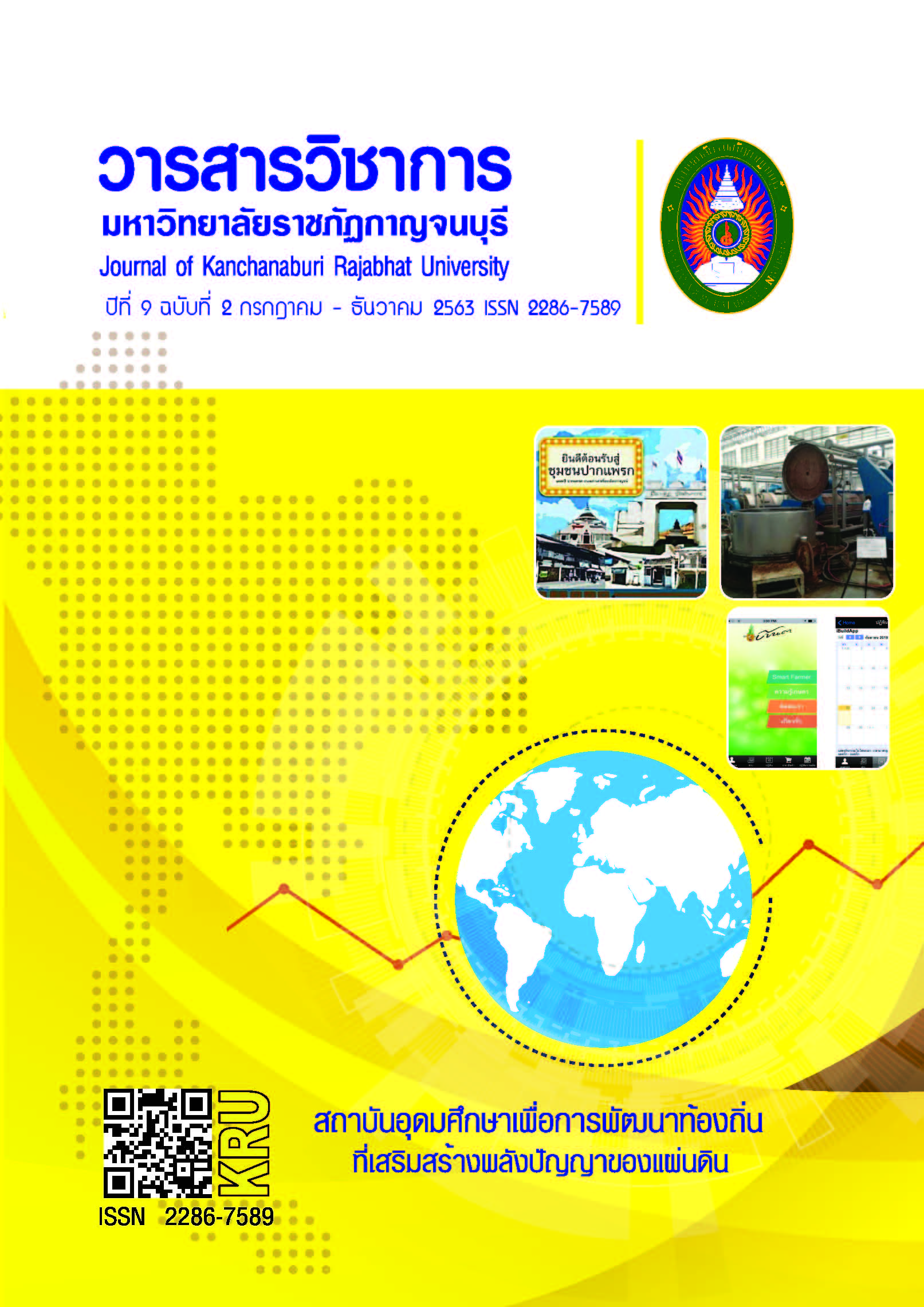THE DEVELOPMENT OF THE ENGLISH SPEAKING ABILITY USING DRAMA AND DRAMA TECHNIQUES OF THIRD-YEAR ENGLISH-MAJOR STUDENTS IN FACULTY OF EDUCATION, KANCHANABURI RAJABHAT UNIVERSITY
Main Article Content
Abstract
The purposes of this research were to 1) study and compare the development of the English speaking ability using drama and drama techniques of the 3rd-year English-major students in Faculty of Education, Kanchanaburi Rajabhat University; 2) study the progress of the development of the English speaking ability using drama and drama techniques of the 3rd-year English-major students in Faculty of Education, Kanchanaburi Rajabhat University; and 3) study the students’ opinions of students on the development of their English speaking ability using drama and drama techniques. The target group consisted of 54 third- year English-major students in Faculty of Education, Kanchanaburi Rajabhat University, in the first semester of the 2018 academic year. The research tools were 1) 15 learning plans; 2) a pre-test and a post-test to assess English speaking skills; 3) an individual observation behavior record form; 4) a questionnaire to survey the students' opinions on the development of their English speaking ability using drama and drama techniques. The research was conducted for a period of 15 weeks, for 4 hours a week, with the total of 60 hours. The data were analyzed using mean, standard deviation and t-test.
The results showed that: 1) The students’ English speaking skills in the post-test were higher than those in the pre-test at the 0.01 level of statistical significance; 2) The students’ progress in the development of their English speaking skills was high; and 3) The average score of the students’ satisfaction with the development of their English speaking ability using drama activities was at a high level.
Article Details
References
ขวัญใจ เตชเสนสกุล. (2555). ความสามารถในการใช้ภาษาอังกฤษ ทักษะที่แรงงานไทยยังต้องพัฒนา.
ค้นเมื่อ ธันวาคม 29, 2560 , จาก http://www.thai-aec.com/458.
จุไรรัตน์ สวัสดิ์ เสน่ห์ สวัสดิ์ และวจี พวงมณี. (2559). ศึกษาปัญหาการสื่อสารภาษาอังกฤษกับอาจารย์
ชาวต่างประเทศของนักศึกษาสาขาวิชาภาษาอังกฤษเพื่อการสื่อสารสากล มหาวิทยาลัย
เทคโนโลยีราชมงคลล้านนา น่าน. น่าน : สาขามนุษยศาสตร์ สังคมวิทยาและการศึกษา มหาวิทยาลัย
เทคโนโลยีราชมงคลล้านนา น่าน.
ถิรวัฒน์ ตันทนิส. (2556). ปัญหาการออกเสียงภาษาอังกฤษของนักศึกษาสหวิทยาการชั้นปีที่ 3
มหาวิทยาลัยธรรมศาสตร์. กรุงเทพฯ: มหาวิทยาลัยเกษตรศาสตร์.
ทิศนา แขมมณี. (2555). ศาสตร์การสอน : องค์ความรู้เพื่อการจัดกระบวนการเรียนรู้ที่มีประสิทธิภาพ.
(พิมพ์ครั้งที่ 16). กรุงเทพหานคร : ด่านสุทธาการพิมพ์.
ธีราภรณ์ พลายเล็ก. (2554). ปัจจัยที่มีผลต่อการพูดภาษาอังกฤษของนักศึกษาชั้นปีที่2 สาขาวิชาภาษาอังกฤษ
คณะครุศาสตร์ มหาวิทยาลัยราชภัฏในเขตกรุงเทพมหานคร. วารสารวิจัยและพัฒนา, 3, 52-57.
นงสมร พงษ์พานิช. (2554). การศึกษาปัญหาของการพูดภาษาอังกฤษในการสื่อสารด้วยวาจาของนิสิต
คณะวิทยาการจัดการ มหาวิทยาลัยเกษตรศาสตร์ วิทยาเขตศรีราชา ตุลาคม 2550 ถึง กันยายน 2551.
วารสารมนุษยศาสตร์, 18 (1), 85
บัณฑิษฐ์ พันสิริ. (2554). ประสิทธิผลของเทคนิคการละครที่มีต่อการลดความกังวลในการใช้ภาษาต่างประเทศ
ในชั้นเรียนของนักเรียนไทยที่เรียนภาษาอังกฤษในฐานะภาษาต่างประเทศ. ปริญญานิพนธ์การสอน
ภาษาอังกฤษในฐานะภาษาต่างประเทศ บัณฑิตวิทยาลัย มหาวิทยาลัยศรีนครินทรวิโรฒ.
พัชรี พลาวงศ์. (2548). “เทคนิคและวิธีสอนออกเสียงภาษาอังกฤษให้กับผู้เรียนภาษาอังกฤษเป็นภาษา
ที่สองหรือภาษาต่างประเทศ.” รามคำแหง, 22,3 : 28-39.
วีรพงษ์ รามางกูง. (2561). คนไทยกับภาษาอังกฤษ. ประชาชาติธุรกิจออนไลน์, ค้นเมื่อ พฤศจิกายน 3, 2561,
จาก https://www.prachachat.net/opinion-column/news-190406.
ศูนย์ข้อมูลความรู้ ประชาคมเศรษฐกิจอาเซียน. (2558). กฎบัตรอาเซียน. ค้นเมื่อ มีนาคม 30, 2560,
จาก https;//www.thai-aec.com.
แอนดริว ลี สวีนนี ทวีศักดิ์ ขันยศ และอารีย์ ปรีดีกุล. (2560). การใช้การจัดการเรียนรู้แบบเน้นภาระงาน
และการละครในการพัฒนาความสามารถด้านการสื่อสารของนักศึกษามหาวิทยาลัยราชภัฏ
พิบูลสงคราม. วารสารครุพิบูล. 4, 2 : 112-123.
Bang, Y. J. (2003). Developing communicative competence through drama-oriented activities
in an EFL classroom. Journal of Pan-Pacific Association of Applied Linguistics, 8, 19-34.
Carson, L. (2012). The role of drama in task-based learning: agency, identity and autonomy.
Scenario. 2, 1-14.
Harmer, J. (2010). How to Teach English. Oxford : Ocelot Publishing.
Jonnathan Salas Alvarado. (2017). The Use of Theater and Drama Techniques to Foster Speaking
Skills in the English Class. Revista de Lenguas Modernas, 26 : 305-317.
Mansoureh Jozi TAJAREH, Mohamad Reza OROJI (2017). The Impact of Drama on Iranian EFL
Young Learners’ Reading Comprehension Performance. Bulletin de la Société Royale
des Sciences de Liège, 86, : 67 – 80.
Rr. Ery Susilawati. (2013). Improving Students’ Speaking Skill Using Drama at the Eleventh
Grade Students of Language Class of Man Yogyakarta II in the Academic Year of
/ 2013. A Thesis Presented as Partial Fulfillment of the Requirements for the
Attainment of the Sarjana Pendidikan Degree in English Language Education, English
Education Department Faculty Of Languages and Arts Yogyakarta State University.
Sarkis, R. (2012). Using Cognitive Strategies to Improve English Speaking Skill and Selfconfidence.
American Journal of Education Sciences. 2(4): 19-23.
Tribolet, C. (2012). Using Cognitive Strategies to Improve English Speaking Skill and
Selfconfidence. American Journal of Education Sciences. 2(3): 36-40.
Simona Floare Bora. (2017). Beyond the mere word :Exploring the language of Drama through
text- and performance-based approaches for developing L2 oral skills. Thesis
submitted for the degree of Doctor in Philosophy in English Language Teaching
Department of language and Linguistics University of Essex.
Suci Lestari, Hery Yufrizal, Ari Nurweni. (2018). Developing Students’ Speaking Through
Drama Performance of SMK NEGERI 1 METRO. Thesis. Graduate Program of English
Education of Teacher Training and Education Faculty. Lampung University.


